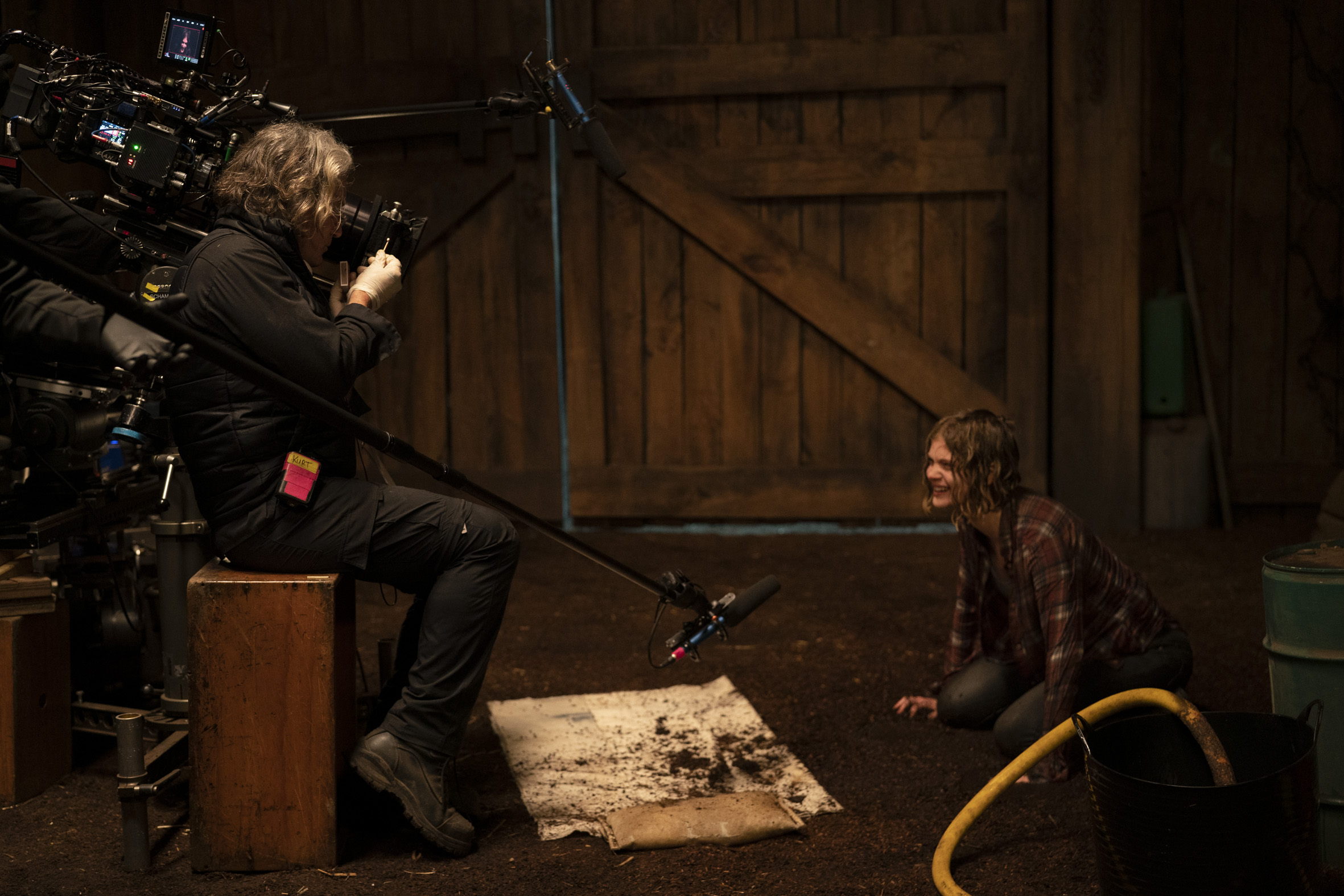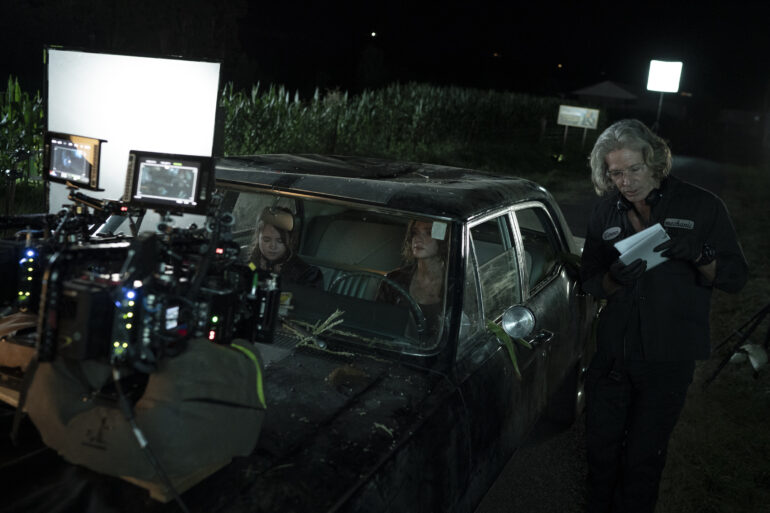A stalwart in the action genre, screenwriter and filmmaker Kurt Wimmer has firmly established his cred, having penned or helmed some rock solid action flicks, including the Brian Bosworth vehicle One Tough Bastard (a.k.a. One Man’s Justice), the post-apocalyptic action films Equilibrium with Christian Bale and Ultraviolet with Milla Jovovich, and some others, including Law Abiding Citizen with Gerard Butler and the very respectable remakes of Total Recall and Point Break. Wimmer has also dabbled in what can be considered the horror genre, having started with the killer kid film Relative Fear in the mid ’90s, and just recently with the effective voodoo film Spell, and now with a complete reboot of Stephen King’s long-running Children of the Corn franchise. Here, Wimmer discusses both the action and horror genres, and his strong contributions to them.
I’ve been on the Kurt Wimmer cinema train since your first film One Tough Bastard or One Man’s Justice with Brian Bosworth …
Oh my god.
I’ve always associated you with the action genre. I saw Equilibrium twice theatrically when it came out, and I never miss a new Kurt Wimmer movie, man. I find it very interesting that you’re getting into horror again. I know you dabbled with it a long time ago with the movie Relative Fear.
Wow! (Laughing.)
Yeah. I dug deep. Let’s talk a little bit about horror. I loved your voodoo movie Spell, which came out during the lockdowns a couple years ago, and it was a really strong film. And Children of the Corn was way stronger than I was expecting.
Well, the thing is that I don’t really look at it as horror. It may sound silly, but let’s be honest: Spell leans very heavily on Stephen King. It’s another version of Misery. His stories are like that. They have an elasticity that allows that. Retold through different lenses. That’s why he’s Stephen King, I think. They’re incredibly accessible. I don’t generally consider those horror films. Those are – Spell and Children of the Corn – are interpersonal dramas to me. Spell is an interpersonal drama between a guy who’s trapped in some old lady and her husband’s attic. And Children of the Corn is about the political revolution that is mounted by children against adults, who they think are corrupt. That’s the way I look at it. Some people die in Children of the Corn, and there may or may not be a monster that did it – He Who Walks, you know? But that’s really the core of it. It’s weird. In horror movies, sometimes the monster is like the clown in Derry. It’s a main character, but in this case the character is only a manifestation, He Who Walks, it’s a manifestation of the corruption and the dying corn that’s going around. Maybe it’s a hallucination. In horror movies, often these creatures exist without the existence of human beings. In this case, this creature – He Who Walks – only exists because of the actions of human beings. Therefore, it’s secondary to what’s important in the movie. That’s the kids, primarily, and the issues that they take when the adults are running their particular world there. So, that’s why it may sound strange that I don’t look at it as horror. That’s not what interests me about it.

There’s been something like 11 or 12 previous Children of the Corn movies before this one, so when I saw that you were doing it I was very surprised. Did the title or the franchise make you shy away a little bit?
Well, somebody’s gotta do it. They’re not going to stop making them, that’s clear. Um, I saw the first one, but I didn’t see the other ones, and I hear they’re not that great, you know? But I think the story, the idea is so strong, the way that Stephen King’s story originated. First of all, Children of the Corn is such a strong title. Even kids who knew nothing about the original say, “Oh, that sounds cool!” right off the bat. Also, the concept of young people rising up to take control of their world and taking the power back … essentially that is something that can be told over and over again through a different lens. The original one was about kids who were very religious. Fanatics. They saw the adults as corrupt. That was appropriate for that time. I don’t think that would be appropriate for now, but the fundamental concept of kids taking control of their environment, their world, and their future is highly relevant now. I think most of us would agree that those who are supposed to be adulting are not doing a very good job of it and are running things into the ground. We know that kids are becoming more aware and more and more politically active and outspoken, but they still don’t have the vote. They’re the ones who have to live in this future. So, to me this is like a Marvel movie where we can pretend all the other movies never happened. We can make or start our own mythology. By going back, we can call it a prequel. It happens before the events of the original story. So, that being the case, it is exactly as if the intervening films never happened because they haven’t happened yet.
I’ve got to bring up Equilibrium while I’ve got you. It’s one of my favorite post-apocalyptic / dystopian future movies ever. The film you did after it was Ultraviolet, which is similar in a lot of ways.
The reason we have dystopian futures in science fiction in general is to talk about social issues. But you can’t talk about social issues if you put them in … Children of the Corn is exactly like this too. Children of the Corn is talking about social issues, right? Adults are fucking things up, what do the kids do? Sorry for swearing. The way Stephen King chooses to talk about it, is by putting it in a small town. Dystopian futures are a way of isolating a world and defining that world and allowing you to talk about social issues. In this case of Equilibrium – and it’s even more relevant today than it was then – is that the government is fundamentally telling you what to think, do, and feel. I think we’re seeing that more and more every day now. Only by placing it outside of reality can you talk about it. If you did it in Los Angeles or Compton or something, people wouldn’t respond the same way. What about Fentanyl? What about Biden? What about Trump? You have to isolate the world into a petri dish if you’re going to create and cleanly express and talk about stuff, and that’s what Fahrenheit 451 and Brave New World are about and why they were inspirations for Equilibrium. We’re all exactly the same. And I think that’s the purpose of science fiction. Space operas aren’t science fiction to me. They’re just westerns to me. True science fiction is science fiction of the mind like Total Recall or science fiction that talks about and examines through thought experiments, social issues through potential social change.
You mentioned Total Recall, and I really liked the movie that they did of that with your script. I really feel the Kurt Wimmer vibe whenever I watch anything you’ve written or directed. I’ve been with you since, well, even Double Trouble, man! (Laughing.) The Barbarian Brothers! I’ve seen ’em all.
That’s insanity. You need help, man. You need help right away.
There’s nothing wrong with Double Trouble!
(Laughing.) No, I’m just kidding. I can’t believe it, I just can’t believe it. That’s a real blast from the past.
Dude, I even liked your Point Break. Every time you do another one, I always get excited because I’m never let down. I jumped on this interview because of that. What is the Kurt Wimmer vibe? You’re tapping into it a little bit in your responses about how you inject the social themes. But there’s something else too. What is it?
Well, first of all I want to entertain. I want to entertain myself. I don’t want to see something I’ve never seen before. I want it to be really exciting. But somehow, make it hyper reality. But it’s not so hyper that you can’t enjoy it. Where you go, “Come on!” Like with Law Abiding Citizen, which is really based fundamentally on reality, but it’s really, I mean, it’s a hyper reality in and of itself too. If you create it in such a way, the audience goes, “Okay.” Hopefully they have a really good time. It’s hard to put your finger on it, because you’re not sure. Children of the Corn has a lot of action in it. The elements, the structure is very much an action film, and I learned everything I know from that from James Cameron. From his early movies. He was a master of structure. A master. Obviously, Terminator, T2, Aliens. And The Abyss, and some of his later movies. But, he just really understood structure and how to accelerate a movie. Not just accelerate the pace, but accelerate the stakes. And accelerate the world. The heights of the action, but not so that it’s repetitive, but the fact that it just keeps getting better and bigger and it doesn’t just feel like it’s pornography. I’ve always taken that from Cameron, and I’m always just instinctive on my part, and I hope to be very very structural in terms of increasing the stakes and the odds and the spectacle of what the movie is. If the audience is still there, then I’ve kinda done my job. I didn’t realize people thought I was crazy until recently and it amuses me. People think I’m kinda nuts.

I’m really glad Children of the Corn finally got released. I was a little worried there. It’s been sitting around for a few years now.
We tried. It was COVID. The world was shut down, theaters were shut down. We were left with no choice.
It was really cool that you visualized He Who Walks. I think this is the first time we see it. I’ve seen a handful of the Children of the Corn movies, maybe four or five of them, and if I’m not mistaken, this is the first time we get to see what they’re all talking about.
Yeah, I think so. Which surprises me because … I did debate it in my head. Should I show this monster or not? I could have made it entirely psychological. But then, I was like, people are paying good money to see a movie and you’re talking about He Who Walks Behind the Rows. Come on, we shouldn’t play hide the sausage with this. Let’s give the people what they want. Let’s entertain them. I think they’ve done the psychological aspect enough. Let’s show the clown in Derry. Let’s show it.
Last question. Equilibrium. If the world ended up in that sort of situation, if we found ourselves living it, everyone on Prozium, do you think you could survive in that world, Kurt?
Absolutely. Because you know why? Because I invented the Gunkata! I am a master of the Gunkata and I am not to be taken lightly! (Laughing.) But also, we’re living in that world, friend. We’re fast coming to it.
Well, I’m on Kurt Wimmer’s team. Thank you for this interview.
Thank you. It was good talking to you.
Children of the Corn is AVAILABLE IN THEATERS March 3, 2023.






